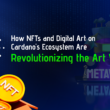Cardano is building an ecosystem of usability, for decentralized finance, governance and also, of course, decentralized identity, not only as a complement to that, but as a specific use case.
The main identity development at Cardano is Atala PRISM, which enables the issuance of digital identities and credentials that users own, control and share easily, securely and privately. Credentials are instantly verifiable from anywhere, eliminating the need for third-party verification services.
The use cases are many and varied, for education, certificates, exams, for government, identity documents, civil records, licenses, for health, medical records, prescriptions, for finance, KYC, statements, agreements, for travel, tickets, travel insurance, among many other uses.
If you want to understand more about decentralized identity you can read an article I published in AdaPulse: The Next Evolution in Blockchain: Decentralized Identity.
Simplification of platforms and processes is essential for adoption. It is not friendly for non-developers, like most of us, to complex systems of record or command input, when the language is more programming than human and colloquial.
The first tool that the user needs for interaction with the blockchain is the wallet and in turn, the payment and collection addresses, are the identification of ownership of funds in the network. Therefore, the proposal I tell you about, has to do with the simplification of the address format, which can be used by wallets, so that the user can easily remember the funds account.
The Proposal
Developers and users need easy to use addresses in DApps and wallets, for user experience and backend integration (e.g. smart contracts, NFT data).
The Decentralised Address Resolution Protocol (DARP) builds on the foundations of Atala PRISM to enable the use of easy-to-remember address names.
Which of the following example addresses would be easiest to use when interacting with DApps and wallets?
- The native address: addr123456789abcdefghijklmnopqrstuvwxyz…….
- or one like this: alice.address
Wallet and DApp providers that adopt the DARP protocol can offer their end users a better experience, as they will be able to use easy-to-remember address names, rather than long, complex strings of characters. Developers can also use DARP to simplify changes to smart contract addresses without the need to deploy a full upgrade of their applications.
How Does it Work?
The W3C-defined DId standard on which Atala PRISM is built provides a service property that allows the DId owner to refer those with whom they want to interact to information that may be useful for communicating with them. This is specified using the serviceEndpoint attribute, which can be a URL, a messaging service or other communication protocols.
The DARP protocol will use this service feature to leverage the use of DIds being made available through Atala PRISM, to allow the owner of a human-readable address (e.g., alice.address) to refer others to a resolution document, which maps their human-readable address to complex addresses, such as a Cardano wallet address.
Mass Adoption of Digital Identity Solutions
This type of service is something that many Cardano users will find useful, whether they are developers building DApps, or end users who want to interact with DApps or simply transfer tokens.
By providing this service as an extension to the underlying capabilities of DIds, it introduces people to Atala PRISM before there are other identity solutions that may be of use to them.
This will grow the adoption of Atala PRISM, allowing other identity solutions for future applications to be more easily introduced, as many users will already be onboarded with a DId.
Similar services already exist, such as the Ethereum Name Service or Unstoppable Domains.
In addition to being built on outdated technology with scalability issues, existing services also use smart contracts to store address information on the blockchain. While this decentralizes the name resolution service, it unnecessarily adds data to the blockchain that need not be immutable. These services can also be costly due to the use of gas.
Cardano’s philosophy, in building a third-generation blockchain solution, is that it improves on the way other blockchains have done things in the past. This is the same philosophy that DARP is using, to get the same benefits that early service implementations provided, but without the shortcomings they experience.
The Budget
The funds requested are USD 47,500, and will be used as follows:
Develop the full capabilities of a Decentralized Address Name Registrar, which:
- Enables users to register a DId/DId document.
- Enables users to register an address name
- Enable users to edit and store their Address Resolution Document
- Issue a verifiable credential for a registered address name
- Allow users to update their DID with the serviceEndpoint of their Address Resolver Document (ARD)
2. Test record lookup, address name ownership verification, and resolution of an address using the ARD
3. Document the DARP protocol and how developers can build support for its use in their applications.
4. Make the code used to build a Decentralized Address Name Registry open source so that others (e.g., Stake Pools) can provide the same service
Roadmap
The work is expected to be completed within 4-6 months, subject to completion of support for decentralized identity artifacts (i.e. DId documents, verifiable credential templates, DId resolution, etc.) in Cardano, following the release of Atala PRISM.
The Team
Phil Lewis tells us that he has over 20 years building large-scale software platforms. On his LinkedIn account he outlines his IT experience in a wide range of roles (such as technical, architectural and management).
He is co-founder of Empowa, a unique decentralized real estate financing platform, which will enable communities to improve their living conditions and create wealth. The project was a winner at FUND5, with funding of USD 60,000. You can see the article published in AdaPulse.
After 5 years designing, building and managing his enterprise-scale SaaS solution, he was invited back to provide consulting services to Civica and its customers on how best to deliver robust and highly available applications, standards-based APIs for service-to-service integration and the use of external identity/authentication providers, using technologies such as SAML and OpenID Connect.
He was technical lead for the project that integrated the data platform and its fully SaaS SSO solution to service 900 public schools across South Australia, driven by the South Australian Department of Education.
As lead architect and technical support manager for all major Civica Education projects, he worked closely with large jurisdictional organizations, such as Catholic Education (SA and WA) and the Department of Education (NT, SA and WA), to deliver Civica’s next generation education software.
Decentralized Identities & NFTs – Solutions & Standards | Cardano Live #29 : video
You can read the proposal at Catalyst.










